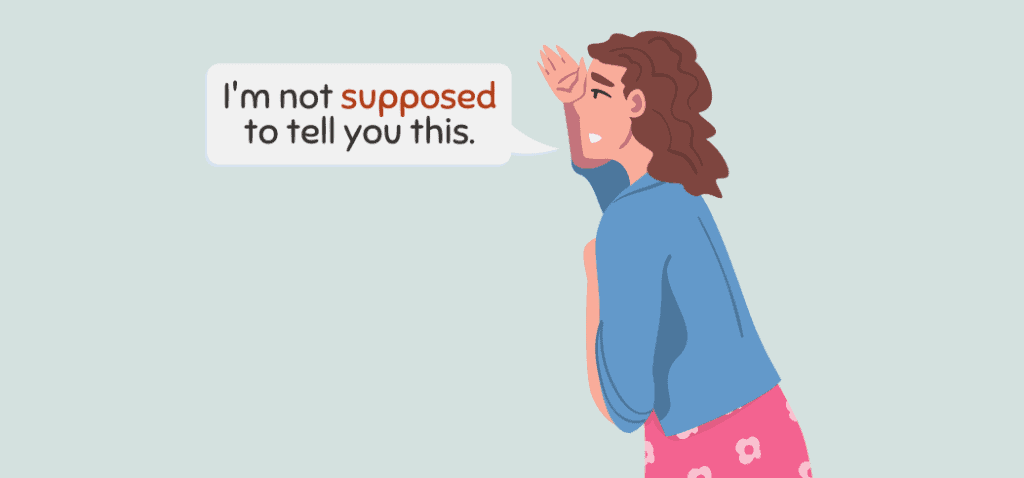The English language is full of grammatical slights that are begrudgingly accepted but still considered incorrect. When used informally, chances are nobody cares. However, if you want to be taken seriously in formal speech or writing, you really should know the difference.
Supposed to and suppose to are widely accepted to be interchangeable, even though one of them is wrong. Do you know which should be avoided? Let’s look at what these phrases mean and why one is correct, and the other isn’t.
Suppose to vs. Supposed to: What’s the Difference?

The first major difference between these two phrases is that one uses a verb and the other an adjective. Suppose (past-tense supposed) is a verb and donates more than one definition of action. Supposed (not the past-tense version of suppose) is an adjective that modifies a noun and is the basis for the adjectival phrase supposed to.
Let’s take a closer look at how this works below.
The Meaning and Use of Suppose

Suppose is a verb that has more than one meaning.
Its first meaning is to assume a truth for the sake of explanation. The past tense, in this case, is supposed.
For example:
- I’m not certain, but I suppose your professor told you to bring notes because you may be able to use them on the quiz.
- His dentist supposed the newest cavity was caused by his poor hygiene and urged him to take better care of his teeth.
The second definition of suppose is to be required to do something due to the argument made or situation one is in.
For example:
- To save myself time explaining again, I suppose I could simply lend you my notes to copy definitions from.
- I suppose I will go to the beach this evening after all.
- I suppose I can accept that you made a valid point worth considering.
Origins of Suppose
The verb form of suppose, meaning to assume as the basis of an argument, has been in use since the 14th century. It is derived from the 13th-century Old French suposer, meaning “to assume.” Its earliest origin is Latin from supponere, meaning to “put or place under or make subject of.”
The verbal use to mean an “admittance of something possible or to believe to be true” is from the early 16th century.
The Meaning and Use of Supposed

Supposed (not the past-tense form of suppose) is an adjective that means generally assumed or believed but not necessarily so. As an adjective, it modifies a noun within a sentence.
For example:
- The supposed theft occurred between 3 and 4 am, but the security cameras didn’t pick anything up, making the report somewhat suspect.
- The supposed discovery of the ancient tomb was said to have occurred in 1852, but it was sealed back up to avoid grave robbers until better security was in place.
Origins of Supposed
Supposed as an adjective has been in use since the 1580s, pronounced as “suhpozed” to distinguish it from the past tense form of suppose.
It is also derived from the Latin supponere and Old French suposer.
Suppose To or Supposed to?
Supposed to is the conventional spelling of the adjectival phrase meaning required to, expected to, or allowed to and is the correct way to state you are obligated or allowed to do something.
Suppose to is an increasingly frequent error in spelling that has become begrudgingly acceptable in the informal text since this incorrect use is understood to mean the same as supposed to. However, it is grammatically incorrect and is cringe-worthy to those who know the difference.
Now that you know, use supposed to and not suppose to.
For example:
- I’m not supposed to tell you this, but your neighbor moved out of state because he got in trouble with the law, and his mom wanted him away from bad influences.
- My sister was supposed to pick us up after the movies, but she forgot, and we had to walk home in the dark.
Let’s Review
Suppose is a verb to mean an assumption of truth or a requirement of action due to a situation. Its past tense supposed should not be confused with the adjective supposed.
The adjective supposed means to be assumed or believed, although a healthy dose of skepticism is allowed in reference to the noun it is modifying. Supposed to is the correct adjectival phrase, although suppose to is used so often that it is generally assumed to be correct as well, despite being grammatically incorrect.
